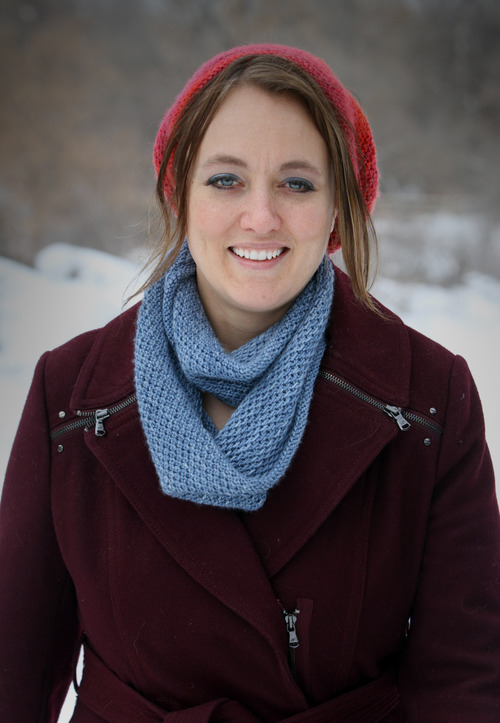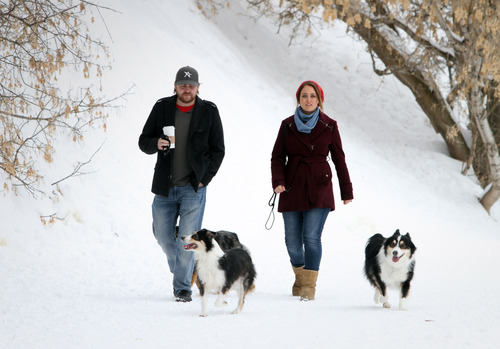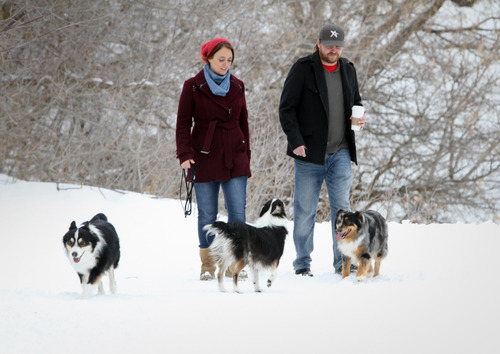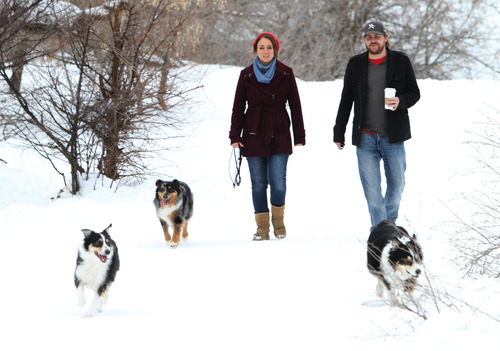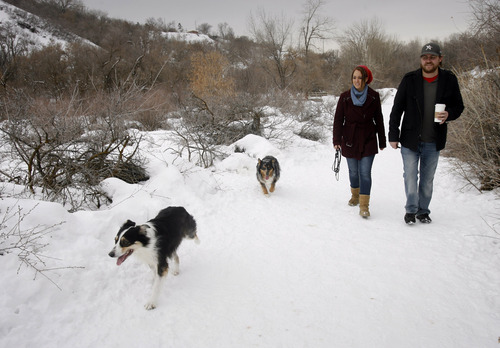This is an archived article that was published on sltrib.com in 2013, and information in the article may be outdated. It is provided only for personal research purposes and may not be reprinted.
Being diagnosed with multiple sclerosis wasn't enough to derail Lindsi Roundy's dream of becoming a pediatric neurologist. But not having health insurance nearly did.
It was either quit the University of Utah's medical school for a job with health benefits or hope to graduate before the disease got worse.
Moved by her plight — the irony of an aspiring doctor unable to afford health care — the Utah Medical Association (UMA) gave her a "scholarship" to pay for coverage. She's grateful, but was angling for something bigger when she appeared before UMA's board in September: expanding Medicaid.
"A lot of doctors have the misimpression that the only people who need Medicaid are those who feel entitled to it," she said. "I told my story, really, hoping to bring some awareness to how difficult it is out there for a lot of people."
The 30-year-old Bluffdale native spoke out again on Tuesday at a legislative hearing. Lawmakers had hoped to also see results from a twice-delayed, state-commissioned study on the risks and benefits of stretching Medicaid to cover an estimated 55,000 uninsured Utahns.
The Utah Department of Health has the study in hand but is reviewing its methodology, said Executive Director David Patton.
Missing from the analysis, he said, are figures detailing the economic impact of billions in federal funding tied to the expansion. It should be released in a week or two, he said.
With three weeks left in the legislative session, that leaves state leaders little time to draw policy conclusions.
There is no hard deadline for deciding, but in order to be ready to offer benefits in 2014, "We would probably have to decide by October of this year," Patton said. "If we don't, we miss out on the federal match for that year."
The issue has drawn scant attention at the Legislature. And the powerful doctor and hospital lobbies haven't pressed the matter.
Citizens like Roundy, however, spoke Tuesday to the less-tangible benefits of a robust health safety net.
Roundy acknowledged critics may ask how she can afford college tuition and not health coverage. Others may wonder why, given her diagnosis, she's persisting with school.
"When I graduate with $350,000 in student loan debt, I won't be rich," she conceded. "But I'll be happy and contributing more to the community than I would have had I given up."
Roundy was diagnosed during her first year of medical school. Medication has kept the disease in check, and she's not pursuing a surgical field in which tremors would interfere with her performance.
For two years, she balanced school and caring for her 10-year-old daughter, who has autism, with a full-time job at a research lab that carried health benefits.
But the demands of this, her third year — 90 hours a week rotating through clinics and hospitals — made it impossible to continue working.
"I looked at every option. I'm not an idiot. There are none," she said.
Until the UMA came to the rescue, she was ready to quit school. "I'm an honor student who scored a 98 percentile on my boards, and I walked into the dean's office with a letter of resignation," she said.
Saddled with a pre-existing condition, Roundy can't just buy coverage on the open market; she'll be rejected. To qualify for government-subsidized coverage for the uninsurable, she has to exhaust her COBRA benefits, which allow people to temporarily continue their workplace benefits after they quit.
Doing so costs Roundy $1,000 a month in premiums, which UMA pays. Her daily injections alone cost $5,000 a month.
As an aspiring physician, she understands Medicaid isn't the whole answer. It doesn't pay well, and there's a need to make patients more accountable for their health and health spending.
But as a stopgap for people in need, it's indispensable, she said. "When people have access to health care, they're healthier and can lead more productive lives. Right now, as an adult, the only way to get Medicaid is to be declared 100 percent disabled. That's insane. The expansion would change that." kstewart@sltrib.com —
States making Medicaid decisions
Swayed by their own studies suggesting the costs of not expanding Medicaid are greater than the tab to expand it, governors from 22 states, including Arizona's Republican Gov. Jan Brewer, have embraced the now-optional provision of Obamacare. Thirteen states have chosen not to participate and the rest are undecided, according to a tally by the Advisory Board Company, an industry consulting group.
"There are new studies coming out every day. ...They are all over the map in terms of what they're looking at and their findings," said David Patton, executive director of the Utah Department of Health. "We're trying to be as objective as possible and ask what is best for Utah." —
Related: How would expanding Medicaid help Utah hospitals?
Utah's hospitals have seen their uncompensated care — charity care plus unpaid bills — more than triple in nine years, to $698 million in 2012. Read a related Salt Lake Tribune story here about how the Medicaid expansion could help cover those costs.


